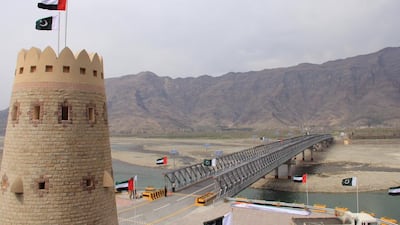ABU DHABI // Since it was founded in 2007, more than 80 countries have received help from the Khalifa bin Zayed Al Nahyan Foundation.
While the charity provides immediate relief in the aftermath of crises, such as the conflict in Yemen, it also takes a more long-term approach.
Part of this is building infrastructure, such as roads, dams, bridges, hospitals and mosques in impoverished parts of the world.
It also funds initiatives in areas such as health care, education, vocational skills and community development.
“The foundation is keen to focus on the financing and implementation of sustainable development projects, targeting the disadvantaged and the poor in many countries to reduce unemployment and provide job opportunities,” a spokesman said. “There is no doubt that the building of mosques, hospitals, schools, streets, and the development of poor communities are important to us because they contribute to the reduction of the suffering of the people in their own countries.”
He cited the Sheikh Zayed bin Sultan Al Nahyan Bridge on the Swat River in Pakistan, which was completed in 2013 after a crossing was washed away in floods, isolating villages.
At 448 metres long and 10.7m wide, the bridge is the largest in the region. It serves as a main route for the residents, where it links 15 cities and 45 villages around the Swat Valley.
About 4,000 vehicles a day now use the bridge, which has two lanes for vehicular traffic and a special crossing designed for pedestrians. The foundation also helps impoverished Muslims from around the world for the Haj pilgrimage.
Since 2008, in collaboration with the embassies of other countries, the foundation has helped 1,954 low-income pilgrims to travel to Mecca.
In 2011, the foundation invested Dh550 million in the Sheikh Zayed bin Sultan Al Nahyan Building for Personalised Cancer Care in Houston, Texas. This houses the Sheikh Khalifa bin Zayed Al Nahyan Institute for Personalised Cancer Therapy and the Sheikh Ahmed bin Zayed Al Nahyan Centre for Pancreatic Cancer Research, providing extensive treatments.
The charity is also offering 13 honorary fellowships to further education in oncology.
The spokesman said members coordinated with embassies to provide aid. Diplomatic delegates also discuss new ideas on society’s needs and the help the foundation provides.
Although the foundation does offer aid, its aim is to help less affluent societies to become self-sufficient. It strives to increase productivity and the income of individuals and communities in development programmes. It also provides educational opportunities and expertise.
“Humanitarian and charitable work is no longer about sending relief assistance to affected countries, but it became developmental to further contribute to the process of expanding educational capacity and expertise of the people. The aim is to have every human reach the self-sufficiency level and not be dependent on the aid,” he said.
aalkhoori@thenational.ae

